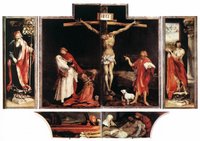

One reader (a good friend of mine) recently asked, "How would a Catholic Anglican articulate a sufficiently Catholic ecclesiology, using Barth's definition?" (See readers comments in my posting "Food for Thought from Barth" http://www.blogger.com/comment.g?blogID=25190947&postID=114435868733104750) I've been pondering how I might be able to address this question all week. There is no easy answer without starting at the center and working outward through the implications of Barth's thought -- something that Barth did not live long enough to do completely himself.
The implications are where the rubber meets the road, where the hard work is done, and frankly where I find myself most exasperated with Barth as a dialogue partner. The Catholic reader of Barth discovers very quickly that for all of his erudition and clarity concerning the center of Christian theology Barth turns out to be just a man, and just as conditioned by his time and context as we are by our own. Simply put, Barth and I do not always agree, and certainly not about many things that I as a Catholic thinker hold dear. Nevertheless it is at the center of Barth's theology that one finds the pearl of great price, quite literally, for that center is Christ. And that is where we will begin.
There are two terms from Hunsinger's How to Read Karl Barth (cf. pp. 105-107) that I find quite helpful in my own dialogue with Barth. They are:
(1) "Soteriological objectivism," which refers to the idea that what took place in Jesus Christ avails for all without any exception, and is subject to no human condition or contingency whatsoever. Whatever takes place salvifically in us (e.g., faith etc.) is thoroughly and radically subordinated to what has already taken place for us in Christ.
(2) "Soteriological existentialism," which refers to the idea that though Christ and his work avails for all, no one actively participates in him and his righteousness apart from faith.
As Hunsinger explains: "The real efficacy of the saving work of Christ for all, the absolutely unconditioned and therefore gratuitous character of divine grace in him, the impossibility of actively participating in Christ and his righteousness apart from faith, the absolutely receptive and therefore nonconstitutive character of human faith with respect to salvation -- all these were axiomatic and nonnegotiable for Barth, because he took them to be the assured results of exegesis when the Bible was read christocentrically as a unified and differentiated whole" (p. 106-107).
In this quote we see soteriological objectivism and soteriological existentialism held in tension in Barth's thought. Christ's saving work is for all, not merely as a potentiality but as an ACTUALITY in Christ. There is no human condition that must be met in us to actualize our salvation that has not already taken place for us in Christ. The universality of Christ's work of atonement is upheld more so and more consistently in Barth than in any other thinker that I've come across; and yes, it would be fair to see this as a kind of "universalism." Yet it is a biblical universalism that we see in Barth as he adamently insists that the universal actuality of salvation in Christ be held in tension with the existential moment of salvation in the individual. To be faithful to the Bible is to acknowledge that Scripture clearly teaches that one's active participation in Christ is impossible without faith, and it is obvious that not all do or will come to faith.
When I first understood what Barth was saying, it was like understanding for the first time that the earth revolved around the sun not the sun around the earth. The theological applications of Barth's christocentrism are manifold, and we could hardly do justice to them in one blog entry. Nevertheless, let me just list a couple to get the juices flowing for future discussion:
(1) What implications might there be for the perennial Catholic/Protestant debates on Justification if our justification/sanctification are viewed as actualized realities in Christ?
(2) How does it change our understanding of predestination if election and reprobation are both understood as actualized in Christ?
(3) What do we make of sacramental efficacy in light of soteriological objectivism? Is there any place left for instrumentalism?
And finally...
(4) How might soteriological objectivism help us better understand the Church's unicity, holiness, catholicity, and apostolicity (i.e., the Nicene notes) in the context of division, heresy, and schism?
Until next time.

3 comments:
This seems to parallel my own development in thinking through the implications of the atonement-although I cannot say that Barth has been an influence, since my acquaintance with his theology is limited to a slim volume of essays edited by Hunsinger. Speaking somewhat crudely, one could say that Barth uncovers the christological heart of the gospel in his "soteriological objectivism", insofar as our participation in Christ- the so-called "existential moment of salvation"-is subordinated to the fact of the last Adam and "what has taken place in him".
It's universalist implications, or Barth's insistence that the atonement avails for all as an actuality IN CHRIST-when held in tension with the particularist implications that follow from his soteriological existentailism-strike me as perfectly consonant with the teaching of St. Paul ( Think, for example, of I Tim. 4:10: The "living God" is "the Savior of all people, especially of those who believe". Paul cannot be saying that God is merely the potential savior of all people; that would mean that God is a super-potential[ but not actual ] savior of the believers. )
I'm not sure how Barth's soteriological objectivism would affect Catholic/Protestant disagreements concerning justification/sanctification-except to say that seeing them as actualized realities in Christ would alleviate the highly subjective-dare I say man-centered emphasis- that crops up on both sides of this divide.
As for the notes of the Church, perhaps identifying them as actualized realities in Christ would enable us to maintain a truly catholic ecclesiology, which is also consonant with Barth's christological center?
I hope that greater minds will chime in here.
Have a blessed Easter, Dan
-Mark
Mark,
To "alleviate the highly subjective- i.e., man-centered emphasis- that crops up on both sides of this divide" would be quite an ecumenical accomplishment, no?
If Barth is correct then everything we experience soteriologically - conversion, faith, repentance, justification, sanctification, even our understanding of what happens in the sacraments - should rightly be considered within the category of soteriological existentialism.
Hence, justification is not something we actualize (i.e. receive) by our faith or by our works or by some combination of the same, but rather something we "live into" by faith, or by faith working through love for that matter.
Friend, I must say, you connect the dots better than anyone I know.
Take care,
Dan
"To alleviate the highly subjective-i.e. man-centered emphasis...would be quite an ecumenical accomplishment, no?"
I can only speak for myself, but the soteriology wars between Roman Catholics and Protestants often betray a morbidly subjective and self-absorbed subtext. Both sides, in other words, tend to argue in terms of "my justification", "my sanctification", "my works", "my faith", even if in principle they mutually affirm the maxim, sola gratia. Hence, justification becomes something that we actualize ourselves, whether by faith and works, or by faith alone ( In a Barthian sense, I imagine that this would be viewed with horror, since it supplants the soteriological objectivism found uniquely in what took place in Christ with a subordinate phenomenom ).
"If Barth is correct, then everything we experience soteriologically-conversion, faith, repentance, justification, sanctification, even our understanding of what happens in the sacraments-should be rightly considered within the category of soteriological existentialism."
Agreed. I would add that a subordinate soteriological existentialism, in all of its sub-categories- depends entirely upon an utterly gratuitous participation in- or a "living into"-the soteriological objectivism found in Christ. Without such an incorporation-in which we may truly say that the church is salvation in the world, but only because she has been realized or translated into all that is objectively true concerning the last Adam-we run the risk of making soteriological existentialism man-centered and autonomous. That is why I suggested that the notes of the church-i.e. her unicity, sanctiy, catholicity and apostolicity- ought somehow to find their origin in Christ. Otherwise the Church would possess these virtues in herself.
-Mark
Post a Comment